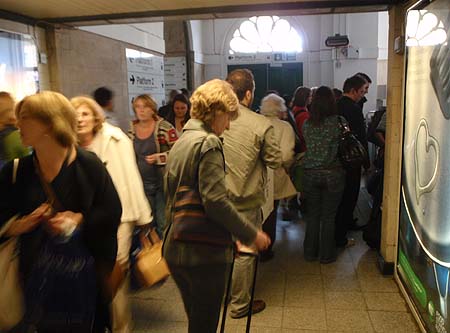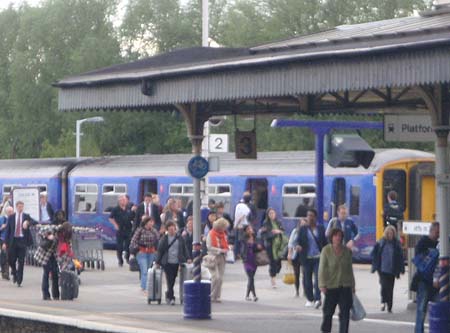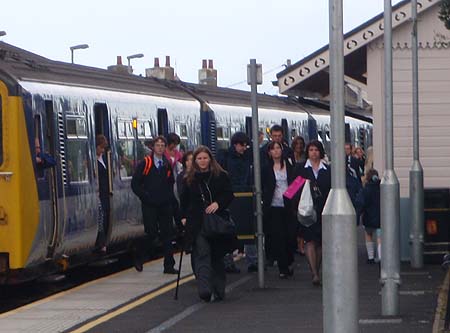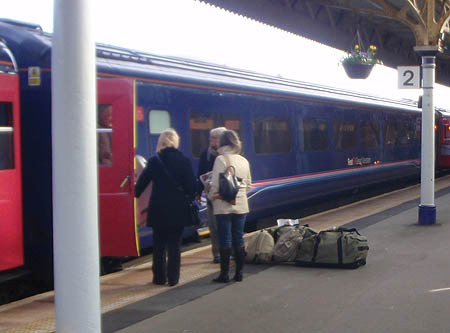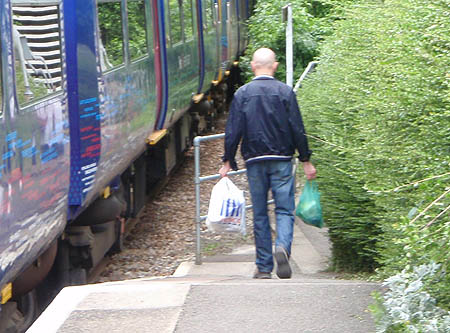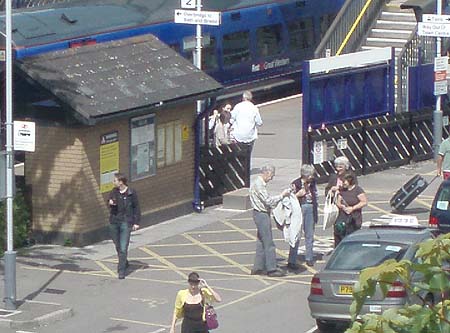|
31024
|
All across the Great Western territory / Who's who on Western railways / Re: Who are the key players in the UK passenger railway industry?
|
on: September 16, 2009, 09:20:12
|
|
Here's a far more subjective follow up. I have tried to state facts above, but opinions of fact may come into this follow up
Does the system work? Well - with some gaping exceptions, most lines have a train service that runs on time (or close to), more or less at the times that people want to travel by train. But it can be much slower, and much more costly than we would like, at times it can be overcrowded, and the infrastructure is very old (time expired?) in parts. Information can be very hard to find.
There are some good people - some VERY good people - running the railways both from a management and from an operational viewpoint. In fact, in the majority of cases I can't find enough words to praise their professionalism and courtesy - it's usually a pleasure to travel by train, and made all the more so by the majority of staff with whom you come into contact. No - the problems that I list below are typically not people based but systemic issues.
Here are some of the criticisms levelled at the system; the reader may consider some of them to be unfair, and there are certainly compromises involved which mean that an improvement in X neccessitates a step backwards in Y.
1. Service Specifications. The service specifications are sometimes said to be micromanaged by the Department for Transport in an attempt to ensure that services are run to suit the DfT» 's need. And even a micromanaged specification can provide anomolies which are intended to serve the passengers to a minimum level, but fail to do so. For example - laudable aim "must be a train at least every 3 hours calling at Dilton Marsh". Problems (a) doesn't run to major destination from Dilton Marsh of Salisbury, (b) in the evening peak, there's a 2 hour wait at Westbury for commuters who leave Bristol at about 5 p.m. (c) ties up a train at certain times of day for a service that's almost empty.
2. Profit over passengers. The DfT sells the franchises to the highest viable bidder, and that bidder then wants to make as much extra money as they can for their shareholders. Note lack of "public / passenger service" in this scenario. For example - Cross Country Franchise was awarded to bidder who reduced cost by slashing long distance train catering, Great Western franchise awarded to company who cut train length by 1/3 on rapidly growing Cardiff / Portsmouth service. Train company operating Westbury / Trowbridge to Chippenham / Swindon route (one of the top 50 commutes in the South West) does not provide peak hour direct trains, but has people use a dogleg route and change trains, adding approx 45 minutes to their daily round trip commute. "What is there to motivate us to provide trains when we take the farebox money anyway?" one of their employees asked me.
3. Lack of trains. There is a shortage of trains of certain types available for the TOCs▸ to lease. With 7 to 10 year franchises, they don't buy the capital stock but lease it, and the ROSCOs» want to make as much as they can from the scarse asset they have. There is little encouragement for the ROSCOs to build more trains due to the changes and shorttermism - they make more money by leasing out 10 ancient trains than 20 new ones.
4. Overcomplex. Where to I start - let me just quote an example: Ask about improving train services on the TransWilts. The Dft point you to FGW▸ , who point you to Wiltshire Council, who point you back to the DfT. No-one takes responsibility. Wiltshire Council have done a number of studies, so have Network Rail (excellent cost benefit study published 1.9.9 as part of the draft GWRUS▸ ) all of which come out in favour of a service that's at least once every 2 hours. But WC▸ now has put aside a further 25k to get another consultants report written to DfT Standards. That money would seed an improved service for a year. In the case of one line (NE England) it was quoted that the admin / franchise costs raised the price of a service 3.5 times on privatisation.
5. Too many changes - both in systems, in franchise holders, and in personell. There is a huge lack of continuity. Look at TUCCs -> Travel Watch -> Passenger focus, at the various successive franchise holders, at the top management changes to staff at those franchise holders. I have been campaiging for an improved train service for Melksham for 4 years. There have been 4 separate MDs in charge of the company providing the service, and 4 or 5 ministers of transport in that time.
6. Fares. The fare system is so complex that it's disreputable - headlines talk about high fares and that's often the case, but there are equally underpriced bargains and ways of legally reducing your costs (e.g. splitting or buying a ticket for a longer but cheaper journey). On one hand, people are frightened off the railways by the cost, and on the other hand revenue opportunities that should buy a better service are being lost. And because the system is so complex, people are sometimes mis-sold tickets, misadvised and then at time harrassed by a penalty fare / "Revenue Protection" system which chases fare dodgers and catches the uninformed in the net.
7. Lack of effective passenger representation. Take a look at all the organisations listed in the industry, and you'll be hard pressed to find one that looks at the existing travellers and the wannabe travellers - those who would use the trains if they ran at the right time / affordable price - and represents their interest for future planning. PF▸ is good for the immediate issues like "trains not washed as often as the spec requires", but powerless and without resources when it comes to "is a service of just 2 trains a day - at 06:15 and 18:45 - from Swindon to Salisbury the correct level and timing for the passengers?"
8. Subject to political whim. It's probably no accident that services such as the TransWilts, through a Tory area, languishes with a poor service whereas other routes such as the line to Workington (labour MP▸ defending a slipping majority) has an hourly train. Major improvements made to the railway infrastructure at Lincoln ... when the MP was also a transport minister.
9. Local control over long distance service. Local government looks after services in its own area. Whilst it needs input / influence over local transport, so often that transport crosses boundaries and the LTA▸ is responsible for perhaps one or two stations. People tend to live in one area and work in another. Example - net daily outflow of 6,000 from West Wilts to work, primarily in Swindon, Bath and Bristol. Even with Wiltshire now being Unitary, you have 4 Local Transport Authorities involved with no journey exceeding 30 miles.
10. Too safe. I'm all for safety. BUT there are aspects of rail which are now so ultra-safe that they raise the price beyond the affordable and potential passengers are pushed onto the less safe roads. Certain trains that have been running well and with good records for 30 and 40 years must be withdrawn by 31st March 2013, other (major parts of the fleet) have a cutoff date six years later. Yet their record is far better than road travel ...
11. Franchises are too short. There isn't time to invest within the 7 to 10 years of the typical franchise - it's all down to short term ism, getting as much revenue out of what you have at day 1. Plan ahead through the complex rail system, and expensive new facilities will just about be coming on board as the franchise ends, leading the TOCs to hope that can regain the franchise for a further period. One heck of a big gamble that few will take.
12. Too many profit points. The DfT gets as much money in for the treasury as possible. The TOC has to make profit for its shareholders (look at a TOC's annual general meeting of shareholders and you'll find some agressive profit boost promises - 10% compound year on year, for example). The ROSCOs alr looking to make money. And that's before you look at senior staff bonuses ;-)
13. Lack of integration. The bus leaves the station a minute before the train arrives ... there's no bus stop at the station ... the connecting train doesn't wait for the late running mainline service ... through ticketing is sporadically available only, and it's often much more expensive that buying the journey in parts.
14. Engineering works and Sunday trains. Sunday is the busiest day of the week in the UK▸ for long distance travel - and yet the railway network often has large sections closed at the weekend for engineering works. There ARE improvements being made here, but it's still very much a case of "could do a lot better". On some services (LM▸ recently), issues can arise where the whole Sunday service is cancelled and very often TOC performance measures excvlude Sundays.
15. Lack of information. It's sometimes very hard to find information / the correct information. Example: I bought a saver return, Melksham to Peterborogh, and asked at Paddingon if I could use it on the 17:30 train; I had been sold it for this train, but the station indicator boards said "saver tickets not valid". I asked two uniformed staff members. One said "yes" and the other said "no". Another example: I asked for a pocket timetable for the TransWilts line - services from West Wilts to Swindon on a route which, you will recall, is a high commuter low. The two daily through trains are shown in book no. 25 (?); connecting services you have to work our for yourself with a combination of books 25 and (?) 2, working out your dogleg changes. The TOC's website will only give you a "personalised timetable" for a period of a few hours, and gives some strange routings too.
16. Low regard for passengers. There's an assumption in some quarters that the passenger doesn't know about rail (and that can be very right - I know that I trusted the rail industry to provide a sensible service until I was rather forced to look under the bonnet from 2005 onwards) and is out to defraud the railways ("I expect 90% of people travelling in .... to not have the correct ticket" says a staff member to me). And this low regard can rise to a higher level - "we're the professionals - you don't know what you'r talking about" attitude. And you'll note - profit over passenger convenience!
17. Poor, mouldering infrastructure. There's a lack on incentive to invest in better facilities, and whilst some low cost, headline grabbing works arfe done, this is by no means universal. For example, Melksham station which serves a town with a population or 23,000 hasn't been significantly improved in the life of the current franchise. Additional signs have been added to say that the station is checked regularly, and to prohibit smoking, and some painting has been done. But the passenger information system, which remains a simple push button operation to give a recorder massage only and was due to be replaced early in the franchise, remains and is often out of service. There is no public telephone, no staff, and just a bus shelter on the platform. The timetable boards show trains from Cardiff to Portsmouth, and advertise cheap day fares to London (not available from Melksham as FGW have withdrawn the off peak trains!) and timetables are NOT available to show the most common journeys - to Bath, Bristol, Filton and London. There is no ticket vending machine - advance tickets from Melksham must be collected an another station, such as Chippenham ... which requires an extra journey at extra cost before you travel.
18. Cap and Collar remove incentive for operational profit. In the current recessionary environment, the train operating companies have their farebox income (or 80% of it) guaranteed by the DfT - which means that they have no incentive to improve services for passengers ... they loose 3/4 of any extra money they take, so why bother?
19. Monopolistic. Although there's supposed to be competition between TOCs for business, the ORCATS▸ system of sharing revenue 'knock for knock' dulls this and they're mostly working "one for all". On many routes, there is only one operator - especially so in the West. Take a look at a rail map showing franchises and you'll see that Swindon is a First Great Western monopoly, for example. There is no competition (and did you realise that First also operate the National Express coaches in many areas, including ours, under license!)
|
|
|
|
|
31025
|
Sideshoots - associated subjects / The Lighter Side / Re: On the buses
|
on: September 16, 2009, 05:57:26
|
... the majority are 'in our area' and they all have some sort of rail or railway connection(s) involved ...
The final one is Gosport and, yes, I will agree that the rail connection is quite tenuous. Others may not agree, but I see Gosport as a road / rail connection all be it via ferry from Portsmouth Harbour station; part of a far better integrtation of road and rail than you see at many other places. London to Lee-on-Solent and you'll take SWT▸ to Portsmouth Harbour, transfer on the ferry, and get the bus onwards. |
|
|
|
|
31026
|
All across the Great Western territory / Who's who on Western railways / Who are the key players in the UK passenger railway industry?
|
on: September 16, 2009, 05:15:24
|
|
The rail industry is a complex one. Gone are the days of "British Railways" when the whole thing was owned and run by one nationalised organisation ... these days you have a plethora or organisations!
Controlling and running the system
DfT» - the Department for Transport.
The Department for Transport specifies a minimum level of service it would like to see running on groups of lines / services and invited bids for companies to provide those services under franchise.
TOCs▸ - the Train Operating Companies
The Train Operating Companies are the franchise winners; they are public companies, operating the services which they are required under the franchise, plus others if wish. As public companies, their primary loyalties are to their shareholders, and their second loyalty is to the organisation which awarded them the franchise - the Department for Transport. Train operating companies are free to run extra services beyond those specified in the franchise - it's a commercial decision, but subject to the availability of paths for the trains and rolling stock, and competition restrictions. Companies without franchises are also free to run commercial services, also subject to the same restrictions.
NR» - Network Rail
Network Rail owns, maintains and runs the structure of the railway, the tracks and signalling systems, and a handful of the larger stations (most stations are run and maintained by the predominant TOC at the station). Network rail is a not for profit company owned by the nation, but its assets do not appear in the government's accounts.
LTA▸ - Local Transport Authorities
Local Transport Authorities are responsible for local transport in their own area, including road and rail. The local transport authority is typically a tier of local government - for example a county council or a unitary authority.
PTEs▸ - Passenger Transport Executives
Passenger Transport Executives are responsible for the passenger transport in certain large cities - with the (rail) transport provided under their instruction by the other organisations concerned with controlling and runningthe system that are listed in this section.
ROSCO» - Rolling Stock Companies
The RoSCos own the trains, and lease them to the Train Operating Companies. When the railways were privatised, the rolling stock was sold to companies which have largely since that time been taken over or bought out by the big banks. Only a few trains (e.g. 5 of the High Speed Trains that Great Western run) are actually owned by the Train Operating Companies.
You will note that there is scant reference above to any of the operating organistions having responsibility to passengers. Although it is clearly in their secondary interest to provide what the travelling public wants, will use, and will happily pay the most money for, that is not their main interest.
Representing Passenger Interests
The following organisations / types of organisation represent (or are intended to represent) the passenger to a greater or lesser extent. The first two have statutory roles and authority
PF▸ - Passenger Focus
Passenger Focus is funded by the Department for Transport and monitors passenger satisfaction, also taking up cases that passengers raise with them where those passengers believe that the TOCs may be operating outwith the franchise agreement. Passenger Focus has relatively few staff - just one person covers the whole First Great Western territory from London to Weymouth, Penzance, Swansea and Worcester.
ORR» - Office of the Rail Regulator.
The Rail Regulator's main role is to ensure fair play between the various train operating companies, but he also provides a great deal of useful infomation on the operation of the railway and
The following have no statutory role:
Customer Panels
Passenger representatives of lines or services appointed by some of the Train Operating Companies to pass passenger feedback to the TOC, and to pass the TOC's views back to the passengers.
TW - Travel Watch
The various Travel Watch organisations no longer have a statutory role. Travel Watch South West is a Community company with a board of directors with a great deal o railway knowledge who arrange regular meetings of representatives of rail user groups, and put co-ordinated views forward to the industry. TWSW» is sponsored by a number of major transport players, rather than being funded by passenger interest groups
RUGs» - Rail User Groups
Independent and often local groups - ranging from effective lobbying groups for their line or area, through to enthusisasts groups with more interest in the past of the railways than their future, and in some cases putting forward ideas which are very much 'thinking out of the box'.
TUCCs - Transport Users Consultative Committees
The precursors of Passenger Focus and the old Travel Watches - the TUCCs were organised around different parts of the country, and had a much more powerful representation (and more resources) that Passenger Focus, which is their effective replacement.
Other players who may be considered significant
Community Rail Partnerships
Groupings which look after the interest of lines for which special local consideration is appropriate. Acorp - The Association of Community Rail Partnerships is a federation of over 60 community rail partnerships and rail promotion groups.
Rail Unions
Organisations whose primary task is to represent the staff who work on the railways to the railway management with regards to pay, terms and conditions, safety, and other matters related to their members employment.
ATOC» - Association of Train Operating Companies
Industry association advocates on behalf of its member companies and provides them with shared marketing, accounting and operational services.
BRB‡ Residuary - British Railways Board Residuary Body
Responsible for land and structures thereon which were part of the British Rail 'empire' but which were considered to be surplus to requirements / used for non-rail activity at the time that British Rail was privatised.
NRE‡ - National Rail Enquiries
National Rail Enquiries (NRE) is the definitive source of information for all passenger rail services on the National Rail network in England, Wales and Scotland. NRE is part of the Association of Train Operating Companies (ATOC), which is responsible for providing business services to the Train Operating Companies.
Safety Directorate (of the ORR), formerly HMRI▸
RAIB▸ - Rail Accident Investigation Branch (of the DfT)
Responsible for safety - the safety directorate (formerly Her Majesty's Railway Inspectorate) is responsible for new works and standards, and the RAIB for learning lessons and improving safety as a result of accidents.
|
|
|
|
|
31028
|
Sideshoots - associated subjects / The Lighter Side / Re: On the buses
|
on: September 15, 2009, 20:40:14
|
1. is Westbury
Yes, 1 is Westbury 5 York
6 Salisbury
2 Melksham
2 is indeed Melksham, and 5 is indeed York. 3 Greater Manchester, Denton? Remember your visit up there a while back.
Yes, No. 3 is Denton. Which just leaves no. 6 ... for which I am saying there is a railway connection, but it's less so that the others and some may argue the point. |
|
|
|
|
31032
|
Journey by Journey / London to the Cotswolds / Re: New Cotswold Line walks book
|
on: September 15, 2009, 17:06:15
|
The CLPG» has just published a new book of station-to-station walks between Oxford, Worcester and Hereford. For details of how to buy a copy, see http://www.clpg.co.uk/Thanks Will ... I'm giving your post a "bump" so it doesn't get lost between the double tracks. I look forward to the day that we can do a Wiltshire Walks book as part of the TransWilts Communtity Rail Partnership marketing plan. |
|
|
|
|
31033
|
All across the Great Western territory / The Wider Picture Overseas / Re: Trenitalia - Italian Railways
|
on: September 15, 2009, 16:10:13
|
Many thanks for that insite into Italian Railways from your visit. I note that although n-one has followed up your thread, dozens of people have read it (and people who read it via "most recent posts" don't even get counted in the stats!). More general note ... posts about wider area experiences are .... err .... very welcome in "The Wider Picture"  |
|
|
|
|
31034
|
All across the Great Western territory / The Wider Picture - related rail and other transport issues / Re: Gloucester Parkway abandoned
|
on: September 15, 2009, 16:07:14
|
From that story: Gloucestershire County Council has set out plans to create a bus priority network in Gloucester ... it has abandoned plans to build a parkway railway station on the edge of the city.
... it wants to create bus lanes on five routes that would feed into a 1,000 space park and ride site at Elmbridge Court as part of a transport package called 'The Loop' ...
It says the new Loop scheme is all about improving the road layout at one of the busiest road junctions in England and encouraging people to use public transport. Aren't there are elements of comparing chalk and cheese by associating these items, except that they mey link to the same budget. A parkway station on the edge of town would have provided long distance travel opportunities from Gloucester / Cheltenham, whereas a park and ride for the city provides a way of people getting into the town. As someone who doesn't know Gloucester very well, I have to ask if there would be any logic in building a park and ride for both the train and the city centre at the same point ... with the added advantage that people who didn't have their cars could share the bus services out to the station with the drivers, then hop on a train. |
|
|
|
|
31035
|
Journey by Journey / London to the Cotswolds / Re: New Cotswold Line walks book
|
on: September 15, 2009, 08:48:28
|
Just a point aout the new double track in the tunnel.
As one track is not currently being used, won't it rust and get damaged?
I note that the book cover that's shown on the CLPG» front page that the original post links to shows the double track. I suspect that track doesn't get damaged by lack of use for a short while - though with a lack of maintainance, plants would grow through and in time become a problem. I'm in Cambridge this week and drove (!) pas the end of the guided busway, layed this spring and opening in November ... my immediate impression was "gosh - look at the jungle of plants growing up already through the track. No doubt they'll take a weed cutter along, or allow the plants to wipe the bottoms of the first few buses clean! |
|
|
|
|
